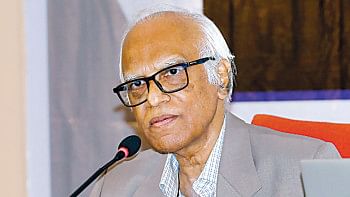Cobbler changes lot thru small entrepreneurship

A young cobbler in Gaibandha Sadar has changed his lot, thanks to his innovative idea that inspired him to set up a small shoe factory at Dariapur Bazar in the upazila.
Raimol Rabidas, 27, hailing from Analertari village in Gaibandha Sadar upazila, joined his father's work of mending old shoes at an early age to help their eight-member family comprising parents and six siblings.
In 2012, Raimol joined a shoe making factory in Rangpur for daily wage of Tk 300. He joined another shoe factory at Pirgachha in 2014.
With the knowledge and experience of making new shoes, he finally decided to set up a shoe factory and returned home in 2015. He hired a small shop at Dariapur Bazar, six kilometres from Gaibandha town, and started making shoes there manually with ordinary tools.
“With my small savings and the money borrowed from a local lender, I was able to set up a tiny factory,” said Raimol.
“In the next winter, I got enough order from local people, especially students, for making new shoes and I had to work hard to meet the demand as I made all the shoes myself.
“Within two years, the reputation of my factory spread to other places and I employed three additional workers. I have also started getting wholesale order from distant places.
“I need a new machine for improving the quality of shoes, but I failed to get bank loan for the purpose. They turned down my application, saying it was not possible without guarantor,” he added.
“There is wide demand of shoes and sandals for both male and female, as I tried to introduce latest models and attractive designs that draw the attention of young generation, said Raimol.
Raimol's father Manik Rabidas said, “I feel proud of my son Raimol. Taking initiative for business, he earns well and helps to run our family smoothly. Gone are the days when I could not feed the children regularly due to poverty.”


 For all latest news, follow The Daily Star's Google News channel.
For all latest news, follow The Daily Star's Google News channel. 



Comments